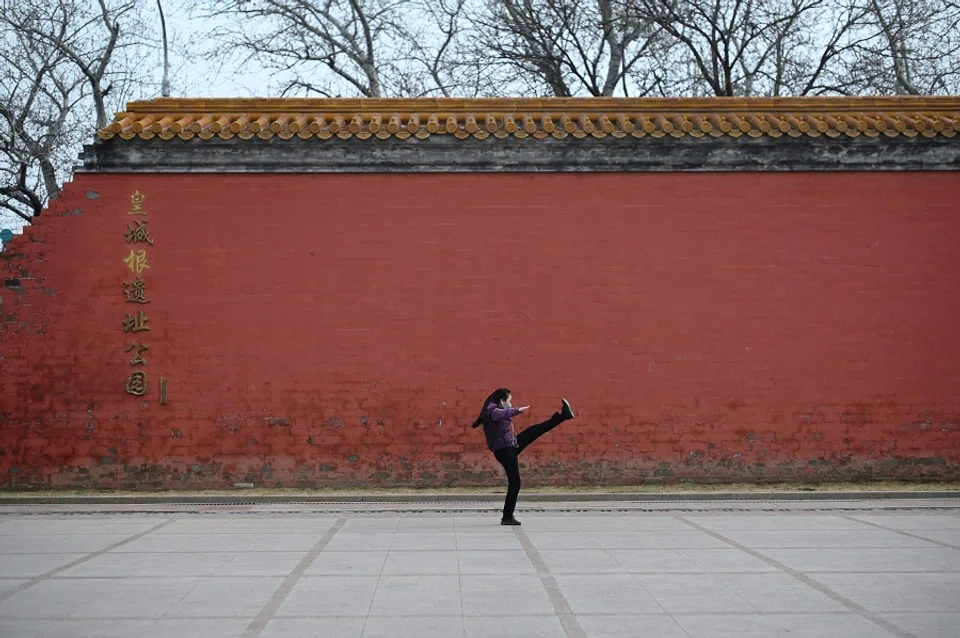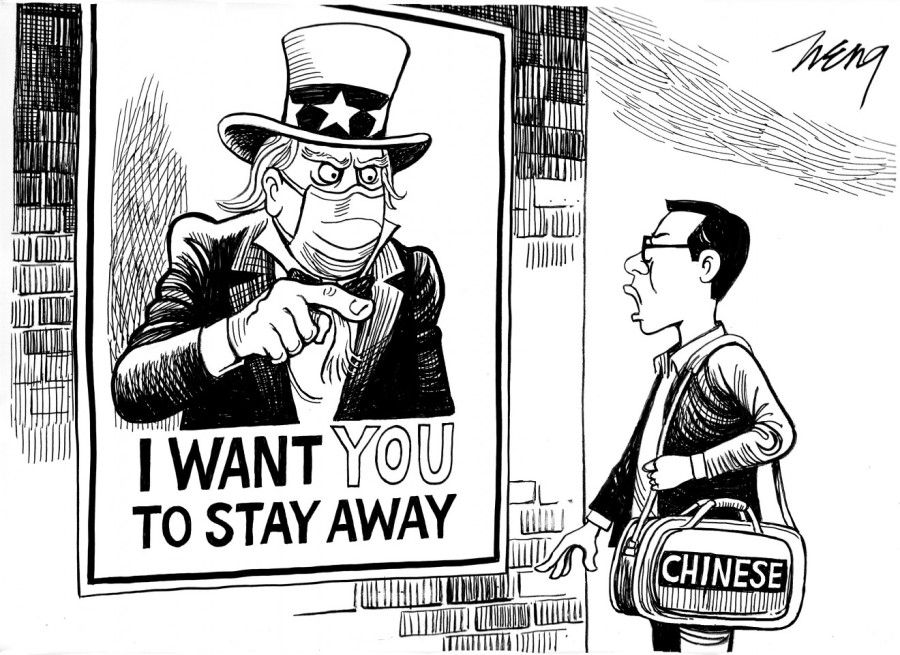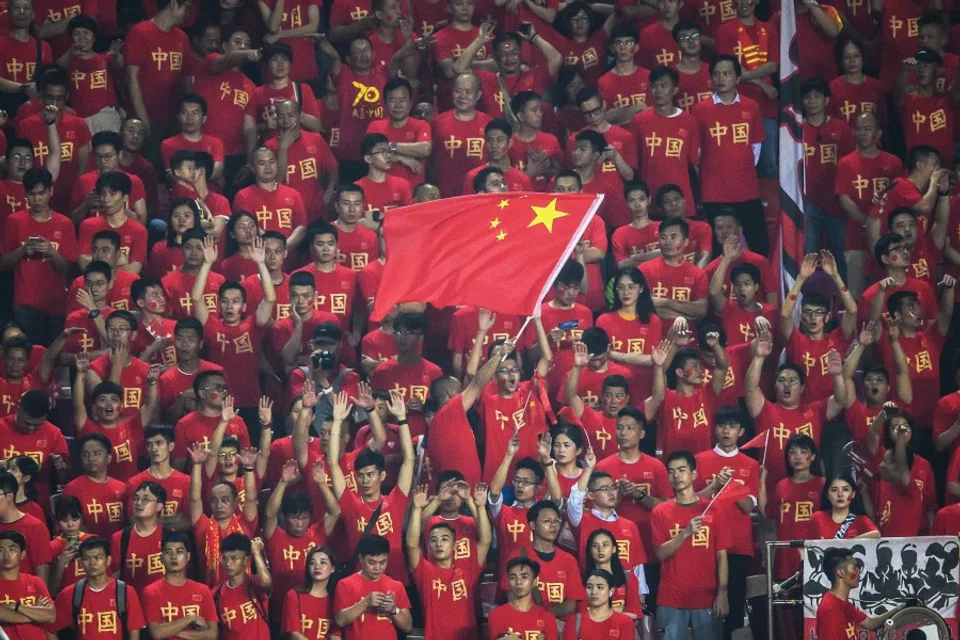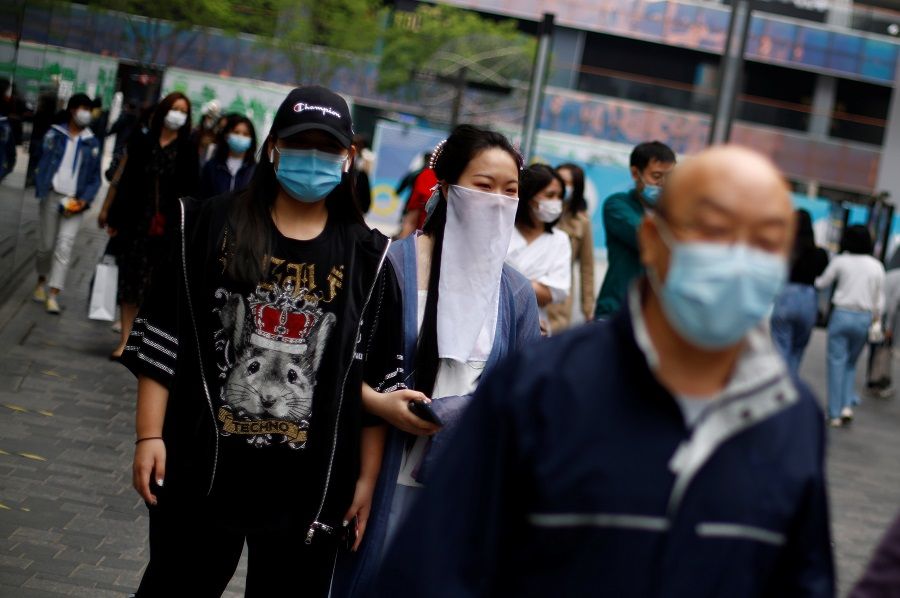Will China turn its back on the world again?

China's opening up and globalisation have not come easily. Neither was a certainty for China. While China was a very open country prior to the Ming Dynasty, it remained isolated for a few hundred years from then and throughout the Qing Dynasty. Thereafter, the insular China was forcibly opened up by Western imperialism and militarism.
China was also relatively closed in the decades before its economic reforms, interacting only with a limited number of countries. It only began actively engaging the West after its reforms. However, this is a lesson written in blood. In the 1980s, when the leaders of the Deng Xiaoping generation decided to engage the outside world, their decision was based on fact: insularity leads to underdevelopment, which in turn leads to being dominated by others. Being forced to open up to the world is passive, whereas implementing reforms to open up is a proactive embrace of the world.
While China proactively "pushed" its policy implementation to open up, the West "pulled" and welcomed China into the global economy.
China's economic reforms presented an opportunity to itself and the world, which in turn ensured the relatively smooth implementation of the "open-door'' policy which welcomed foreign investment. Inherent in this outcome is an interactive "push" and "pull" relationship between China and the West. While China proactively "pushed" its policy implementation to open up, the West "pulled" and welcomed China into the global economy. Comprehensive exchanges and integration between China and the West occurred only after China's accession to the WTO.

Will Covid-19 turn China inward again?
China has transformed from a poor country, culturally and technologically lagging behind others, to the second largest economy in the world. From being a closed economy, it has become the largest trading country. It has also changed from a vast agricultural country to a world factory. These, undoubtedly, are the results of China's open-door policy.
Will the Covid-19 pandemic activate the metaphorical circuit breaker and break the flow of exchanges and activities in China-West relations, and cause China to turn its back on the world again?
Despite China's opening up and integration with the global economy in the past 40 years, it is abruptly revealed that China is actually not ready to embrace the world and that the West is not ready to accept China.
To those who have always believed that China and the West are inextricably integrated, it is implausible that the Covid-19 pandemic will sever China-West relations and cause China to once again become insular. Indeed, until US President Trump initiated the China-US trade war, there was much belief in the economic symbiosis between China and the West. While some in the US have used "Chimerica" to describe the China-US relationship, others in China have likened it to a marriage.
Even as the US began to engage in economic nationalism and trade protectionism, the Chinese leadership continued to stay level-headed, expressing on many occasions its determination to continue to globalise. With equal resolve, China concluded the painstaking negotiations of phase one of the trade pact with the US.
In fact, the "push and pull" relationship between China and the US (the West) has evolved into a "squeeze and withdraw" relationship.
However, the Covid-19 pandemic appears to have changed everything. Despite China's opening up and integration with the global economy in the past 40 years, it is abruptly revealed that China is actually not ready to embrace the world and that the West is not ready to accept China. In both China and the West, particularly the US, emerging nationalism and populism are contributing to the escalation of the China-US cold war and increasing the possibility of sporadic hot wars between the two countries.
Not "push and pull" but "squeeze and withdraw"
In fact, the "push and pull" relationship between China and the US (the West) has evolved into a "squeeze and withdraw" relationship, one in which the US (the West) wishes to squeeze China out of the global system and China subconsciously withdraws from it. Not only are they no longer converging, they have become divergent.
Let us first discuss the "squeeze" by the West. The West has long had a distrust of China. The various versions of the "China threat" theory, prevalent in the West since the early 1990s, are indicative of the apprehension towards China. The distrust by the West is understandable because China is a different civilisation of different cultures, political systems, ideologies and value systems. Precisely for this reason, China-West relations have never established adequate political trust and are based on interests alone.
Only interests are eternal, so it is understandable that international relations are based on interests. However, it is not enough for relationships to be based solely on interests. While interests constitute hard power, trust is soft power, without which hard power can easily be construed as a threat. In the China-US trade war prior to the Covid-19 pandemic, many in the West have criticised China out of distrust for leveraging the interdependence between the economies of China and the world for self-interest, regardless of whether China had indeed done so. The West itself, though, is no stranger to leverage as seen in its customary use of economic sanctions against non-Western countries.

Western logic progresses from distrusting China, to sensing the Chinese threat and to ostracising China. Prior to the China-US trade war, the West has always believed in its ability to change and shape China in its envisioned image by integrating China into the global economy. As a clear turning point in the China-West relations, the China-US trade war has led the West (especially the US) to abandon this belief, which was considered by Western scholars to be naive. Since the West is unable to change China, it has resorted to ostracism.
The worsening attitude of the West (the US) towards China due to the Covid-19 pandemic is an extension of this logic. From the outset, the US politicians had their own agenda and did not assume any responsibility for the outbreak in the US. Instead, they consistently blamed China, in ways such as the dispute in naming the virus, the various conspiracy theories regarding the virus' origins, the subsequent allegations against the WHO and the ex post facto charges against China. These are all part of the agenda of US politicians.
Evidently, the logic behind the actions of the US extends to the entire Western world. Despite China's endeavours after gaining control over its domestic epidemic situation to provide medical supplies to over 100 countries, including some Western countries, the West's distrust of China has skyrocketed. The overseas medical aid offered by China is regarded as "mask diplomacy", "soft power diplomacy" and "geopolitical diplomacy". High-ranking officials of the West, including the UK, France and Germany, have directly or indirectly laid charges against China after the fact.
Unless a reversal in the China-West relations happens in the near future, a new and bigger wave of anti-Chinese and anti-China sentiments will be inevitable during and after the Covid-19 pandemic.
When the West turns from "pull" to "squeeze", China goes from "push" to "withdraw", neither physically nor in substance but in terms of thought and attitude. The Belt and Road Initiative has demonstrated China's embrace of the world in recent years. However, many Chinese have started withdrawing from the global stage in terms of thought and attitude, resulting in an "I am the world" mentality which is similar to that of the Americans.
Internationalisation and the rise of nationalism
China's reforms have resulted in an increasingly internationalised Chinese economy in every aspect. In terms of openness of trade and investment, China is even more international than some Western countries.
Instead of choosing to interact with and learn from the West, the people huddle together and unite to deal with the situation. This logical behaviour is clearly a vicious circle.
However, the people's mentality is increasingly inward-looking due mainly to the rise of nationalism, among many reasons. With immense pride in the rapid emergence of China, the Chinese have seen for themselves through the country's opening up over the years that the systems in the West are far from perfect. However, they do not fully understand the process of China's emergence even as they enjoy the success of the reforms. Although no one denies that it is the outcome of sheer hard work of the Chinese people, China-West interactions have evidently played a part too. Without the "pull" by the West, China's emergence will still take place eventually albeit via a much more arduous course.

Ignorant of this, the pride of the people swells. They believe that the West has declined and that China has comprehensively surpassed the West. Some even begin to consider themselves "teachers" of the Western world.
However, when faced with a deteriorating external environment and material oppression by the West, especially in technology, there is a stronger tendency for the forces of nationalism and populism to be internalised. Instead of choosing to interact with and learn from the West, the people huddle together and unite to deal with the situation. This logical behaviour is clearly a vicious circle.
The Chinese elites that are regarded as the most cognisant of global affairs and the West, have become the group with the strongest nationalist inclinations. Instead of leading the people, they yield or even resort to populism, with obvious consequences.
The world's behaviour has been similar throughout the Covid-19 pandemic so far. Nationalism and populism among the common people have led to severe fragmentation within societies. Everyone possesses an unequivocal ideological identity, giving rise to a clear divide between "us" and "them". The controversies around Chinese author Fang Fang (方方) and her online Wuhan Diary, written in Wuhan between 25 January and 25 March 2020, bring to mind the various historical instances of getting one's house in order before resisting foreign aggression (攘外必先安内).
The Confucian society is inherently conservative and withdrawn, so its internationalisation is very difficult. The highly internationalised societies in Japan and the four Asian dragons (South Korea, Singapore, Taiwan, and Hong Kong) are forged through deliberate efforts by their exemplary ruling elites who are themselves highly internationalised. These societies have been considered part of the Western world, particularly since World War II, and their ruling elites understand how the Western world operates and strive to implement social and international integration.
Today's China appears to be different. The Chinese elites that are regarded as the most cognisant of global affairs and the West, have become the group with the strongest nationalist inclinations. Instead of leading the people, they yield or even resort to populism, with obvious consequences.
Despite China being the second largest economy and the largest trading nation, the failure of the Chinese bureaucracy lies in them forgetting that there is no clear line between domestic and international affairs. As the Chinese economy is highly internationalised, domestic developments will have significant external ramifications. It appears unlikely that the local government officials and individuals who engage in aggressive "wolf-warrior diplomacy" consider the external implications of their words and deeds. More likely, they regard China as the world, which explains the frequent diplomatic incidents in recent times.
Even if the people overcome the barriers, they will resemble aliens who do not know how and what to communicate with the world. Naturally, the world will also be unable to identify with them.
The same situation is happening among the general population. In fact, the elites and the public mutually reinforce each other. Commercial nationalism has reached an unprecedented zenith in the we-media era as an increasing number of we-media channels gravitate towards "patriotism". Why have the media authorities failed to curb media manipulation and profit-seeking in the industry? If the media and individuals can be effectively regulated due to political sensitivity, why not ignorant remarks like "(a certain) country wants to return to China" and other opinions that can provoke extremely negative international sentiments?
Once withdrawal from the world forms part of the people's psyche, the psychological distance between the people and the world increases and the barriers to the world become more daunting. Even if the people overcome the barriers, they will resemble aliens who do not know how and what to communicate with the world. Naturally, the world will also be unable to identify with them.
"I am the world" is but a step away from isolationism
If China adopts the concept of "I am the world", then it is not far from once again isolating itself. This has happened before in Chinese history, and is a phenomenon I term the "Ming Dynasty trap". There was a period of time during the Ming Dynasty when China was unmatched in national prowess (such as Zheng He's seven maritime expeditions to the West) and social capabilities (such as the maritime merchants' resistance against the Wokou, or Japanese pirates). With the mindset that "the heavenly empire is short of nothing and does not need to open up", the Ming Dynasty stopped the maritime expeditions, which eventually resulted in China conceding the Age of Discovery. The Qing Dynasty inherited the Ming legacy and remained closed to the rest of the world until its comprehensive defeat by the West in modern times.
Despite its decline, US manufacturing still leads by far, followed by Europe and Japan in the second rung, with China in the lower end of the third rung.
This does not mean that China closing its doors to the world again is inevitable because it is not the entire country that is blinded by pride. Of particular importance is that the country's leadership, among various social and elite groups, remains cognisant of possible perils. The leadership has previously accepted the differences and sought common ground through interaction with the West. Common interests and values were discovered, based on which dialogues with the West were possible.
For some time, China and the West also had dialogues on values, including democracy and human rights. China has its own value system which is different from that of the West, and since neither value system could replace one another, no substantial progress was made. Nevertheless, dialogue is important in itself as it requires open minds.

For various reasons, China has had fewer dialogues with the West in recent years, but the Chinese leadership continues its push for globalisation. Evidently, the Chinese leadership recognises the challenges an emerging China faces. The reality for China's manufacturing industry, of which the Chinese are proud, remains grim. Despite its decline, US manufacturing still leads by far, followed by Europe and Japan in the second rung, with China in the lower end of the third rung.
This is due to the China-West "push" and "pull", which account for the diffusion of Western technology in China. To become a manufacturing superpower, China requires another 30 years. Simply put, if the US and Western countries mass-produce finished products, then many Chinese industries are still at the assembly stage and produce very few finished products.
China will neither cease its development nor perish, regardless of the actions of the US and the West. However, it is entirely possible that China could turn its back on the world again if it "withdraws" and the West continues to "squeeze". Once allegedly compared by Napoleon to a "sleeping lion", will China resume its sleep shortly after awakening? Not to be taken lightly, this will test the mettle of this generation.
